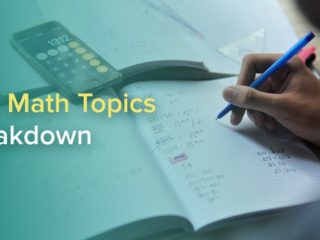| Getting your Trinity Audio player ready... |
If you are just starting with your SAT prep, or even if you have been studying for the SAT for some time, you may wonder how to prepare for SAT math. For many students, learning SAT math is a very daunting process. So, in this article, we will present 10 crucial tips for studying SAT math and preparing for test day! Some of these tips will be relevant to students just starting SAT prep, while others will be more relevant to those who have been studying for some time.
Here are the topics we’ll cover:
- Tip #1: Know the Enemy!
- Tip #2: Get Your Baseline Score
- Tip #3: Select Great SAT Math Prep Materials
- Tip #4: Topical Studying Is a Great Way to Master SAT Math
- Tip #5: Practice What You’ve Learned
- Tip #6: Memorize, Memorize, Memorize!
- Tip #7: Do at Least Some SAT Math Studying Every Day
- Tip #8: Don’t Forget to Review
- Tip #9: Get Comfy With Your Calculator
- Tip #10: A Study Group Can Work Wonders
- In Summary
- Frequently Asked Questions (FAQ)
The first step is to make sure you know about the format and content of the SAT.
Tip #1: Know the Enemy!
If you are completely new to the SAT, we recommend taking a practice exam to get a starting score. However, one mistake I see too many test-takers make is jumping into that practice test before developing any foundation. Yes, you are just aiming to get a starting score. However, make it a fair fight! Before taking the practice test, read about the structure of the SAT, the major topics covered, the types of questions you may encounter, and any other specifics about the SAT math section.
For example, get a feel for topics tested, such as algebra, functions, word problems, trigonometry, and coordinate geometry. Then, become familiar with the question types: multiple-choice and student-produced response (grid-in) questions. Additionally, understand when you can and cannot use your calculator. In general, just get familiar with the SAT, and then take the practice test.
TTP PRO TIP:
Before taking a practice exam, familiarize yourself with the content and structure of the SAT.
Let’s discuss the process of taking your first practice test now.
Tip #2: Get Your Baseline Score
As we just learned, you must begin your prep by taking an SAT practice test. This step is quite crucial, but I find that students generally are very scared to take this initial practice test. They are afraid to see their scores. They are worried that they are not close to their target scores. But remember, you aren’t supposed to be hitting your score goal at this point!
Rather, you are taking a practice test to get a “real-time” look at your SAT skills, so that you can plan accordingly. Without that data, you can’t ascertain whether you are looking at a 6-week endeavor or a 6-month endeavor. So, do not stress; just make sure you get it done! Once you’ve finished the practice test, you’ll see how far you are from your target score, and then you can develop an estimated timeline for your prep.
TTP PRO TIP:
The score from your practice test is important for helping you determine a study timeline.
How to Take Your First SAT Practice Exam
We have established the importance of taking your first practice exam, but let’s discuss how to make it happen. The College Board offers 8 free practice exams. So, to make things simple, take “SAT Practice Test 1” from the College Board website.
Since the data collected from this practice test is very important, take the exam seriously and do your best to replicate test-day conditions. Take the exam on paper (as opposed to online), take it in a quiet location, and take only the breaks that you will have on test day. Once the practice test is complete, you will be ready to begin the next phase of your prep!
TTP PRO TIP:
Make sure to replicate test-like conditions when taking your first practice exam.
Tip #3: Select Great SAT Math Prep Materials
Up to this point, you have learned about the SAT and taken your first practice test. That’s a great start, but that’s just the beginning. To be successful in your SAT prep, you need top-notch resources containing great SAT math content and strategies. Options range from SAT workbooks to live classes, online classes, and online courses for self-study.
If you are confused about which route to take, talk to some of your friends or classmates who already have taken the SAT and find out what resources helped them get a great SAT score. Also, check the books and online resources out for yourself. Most classes offer a “free drop-in,” so you can attend a free class before signing up. Most self-study courses offer free trials, so you can check them out before committing to a paid subscription.
Ideally, you want to find a resource that teaches SAT math in a way you truly get. Ask yourself, am I learning skills that will help me crush SAT math? If the answer is yes, then you have found the right resource!
TTP PRO TIP:
Research and try SAT prep options before deciding on a long-term resource.
Tip #4: Topical Studying Is a Great Way to Master SAT Math
When evaluating resources for SAT math prep, it’s helpful to look for options that contain a study plan that shows you what to do from beginning to end in your math prep. However, more importantly, the study plan should guide you through your SAT math prep in a topical manner.
Topical studying is pretty much just as it sounds. You focus on one topic at a time and practice just that topic until you have mastered it. Why is topical studying so important? Interestingly, SAT math is difficult not only because of the content tested, but also because there are so many topics that you must understand and master to get a great SAT score. In other words, there is so much that can be thrown at you on the SAT, but so little is! So, learning each SAT math topic one at a time will help you master all the topics that may be tested. As a result, you’ll be ready for anything on the day of your exam.
TTP PRO TIP:
Topical learning is the best way to study for SAT math.
Tip #5: Practice What You’ve Learned
I can’t tell you how many students I see struggling with the SAT math test who do the learning, and then skip the practice! I mean, it kind of makes sense why they would do it. First, I know that SAT students are busy, so they want to get through their SAT prep as quickly as possible. Second, students tend to convince themselves that they understand a topic right after reading about it. Thus, they don’t see any harm in skipping practice. Don’t make this mistake!
Practice what you have learned to confirm mastery and commit your new skills to memory. If you’re concerned with how to study SAT math effectively, this practice is a key component!
TTP PRO TIP:
Once you have learned a new topic, answer practice questions based on it.
An Example of Topical Learning and Practice
You may be wondering how topical learning and practice would look in the real world. Here at TTP, we have perfected the art of topical learning and practice. Let me pull out an example from our study plan, from the chapter on quadratic equations.
Students are first presented with a chapter on just quadratic equation concepts. For example, students learn about factoring quadratic equations, FOILing quadratic equations, the discriminant, solving systems of equations with a linear and quadratic equation, factoring by grouping, etc. We have a total of 20 lessons covering those concepts. As we present each concept, students practice 2 to 4 example questions based on each topic. For example, after a student learns about the quadratic formula, they then immediately practice two questions based on quadratic equations.
Once the learning is complete, students practice what they learned in the entire Quadratics chapter. They work through 13 quadratic equation chapter tests of 10 to 15 questions each. This allows them to ensure that they understand what they’ve learned and to fill in any lingering knowledge gaps.
By studying this way, students ensure that they fully grasp what they need from Quadratics before moving to the next chapter in their study plan.
Now that we understand how topical study and practice should work, let’s discuss the importance of memorization.
Tip #6: Memorize, Memorize, Memorize!
As we’ve already mentioned, there is a ton to learn in SAT math. There are hundreds of formulas and math concepts. Sure, you have access to a small formula sheet on the SAT, but even if you skip memorizing those formulas, there are so many more you need to know!
Thus, to be at the top of your game, you’ll want to memorize these formulas. A great way to memorize them is by using flashcards. Flashcards are also great because they allow you to study on the go, which means you can easily expand your daily or weekly study time.
TTP PRO TIP:
Make sure that you have critical formulas and concepts memorized by test day.
Let’s discuss in more detail how to use flashcards.
How to Create and Use SAT Math Flashcards
Your flashcard deck should contain any formula or math rule you may need to know for SAT math. For example:
- In Quadratics: x^2 – y^2 = (x + y)(x – y)
- In Geometry: diagonal of a square = side√2
- In Coordinate Geometry: slope = ΔY/ΔX
However, you do not have to limit your flashcards to just these formulas. As you get certain things wrong in your math practice, you can make flashcards based on your mistakes. For example, if you misused the average rate formula, create a flashcard that ensures you will not repeat the mistake. If you made a mistake converting units, again, make a flashcard addressing that mistake. These are just a couple of ideas, but I think you get the point. Make a flashcard deck that helps you improve your knowledge base and limit your mistakes.
Lastly, use flashcards to make your learning fun. Play a game with yourself or your friends. See how many times you get a correct answer from your flashcards in a set number of minutes. Gamifying your prep is just another way to maintain positive study vibes and motivation as you learn SAT math.
TTP PRO TIP:
Make a flashcard deck that allows you to memorize formulas and limit your SAT math mistakes.
Next, let’s discuss the importance of studying SAT math at least a little bit every day.
Tip #7: Do at Least Some SAT Math Studying Every Day
Have you ever heard the phrase “out of sight, out of mind?” That phrase could not be more relevant to your SAT math prep. Preparing for SAT math is a tall order, and if you’re not studying consistently, you can quickly fall behind. So, try to fit in at least some SAT studying each day.
Yes, the majority of your studying will happen when you are sitting down at your desk working through your SAT materials. However, you will have days when you can’t get to your desk or open your SAT course. So, on those days, do some smaller things that allow you to move forward. Do a few SAT practice problems or pull out your flashcards for some review. By doing so, you can keep your SAT math studying in the forefront of your mind and ensure that you are inching toward your goal.
TTP PRO TIP:
Study at least a little SAT math daily.
Tip #8: Don’t Forget to Review
Topical learning is great. That much has been established. However, because you are learning each topic individually, as you move to new topics, you may forget what you learned early on in your prep. However, by incorporating review into your prep, you can actively fight against forgetting previous concepts.
Hopefully, your study plan contains review modules. However, if it does not, do your own weekly review activities. Certainly, we have established that flashcard review is an amazing way to get in some mixed review. Additionally, you can answer problem sets containing questions on past topics. Try to do 20 questions at a time, as well as a mix of multiple-choice and grid-in questions, so these quizzes emulate the SAT math sections.
For example, if it has been weeks since you encountered a quadratic or exponent question, then build a review set on those two topics. The results from that review test will clearly show you what areas to work on as you move forward with your study plan.
TTP PRO TIP:
Review SAT math concepts weekly through flashcards and mixed problem sets.
Now, let’s discuss some calculator tips.
Tip #9: Get Comfy With Your Calculator
Whatever calculator you use on your exam should be one you’ve been using for your SAT math prep all along. In other words, don’t change up your calculator two days before your SAT.
Additionally, knowing when to use your calculator is an important part of your preparation. After all, since the SAT is a timed exam, you need to ensure that your calculator use is a net positive in your timing strategy, not a net negative.
For example, there should be no need to use a calculator when calculating the sum of 11 and 16 or the product of 9 and 8. After all, you will still have to do these types of manual calculations in the non-calculator math section. So, don’t use a calculator for them in the calculator section!
TTP PRO TIP:
Develop a sound calculator strategy before test day.
Tip #10: A Study Group Can Work Wonders
Odds are that you are not the only one around who is highly motivated to do well on the SAT. So, team up with your friends who also need to prep for the SAT. There is strength in numbers, and all of you will benefit from joining forces.
Having a serious study group has several benefits. First, holding weekly study sessions on specific topics will keep you organized and on track. Second, having group goals will force you to study even on days you don’t feel like studying. After all, you won’t want to show up for the next session unprepared. Next, you can share strategies, solutions, and shortcuts to the problems that the group reviews. And finally, you get a chance to get in a bit of socializing while you’re studying.
You and the other study group members can work together to agree on the frequency of study sessions, the location, the topics, and other details. Just make sure that all members are committed and motivated to be successful. If so, you’ll find that the SAT study group will contribute significantly to your preparation efforts.
TTP PRO TIP:
An SAT study group is an invaluable tool for helping you reach your SAT score goal.
In Summary
SAT math can be challenging. So you need to use every tip you can to study smarter and save you time, energy, and stress! In this article, we’ve presented 10 tips to ease your way during your SAT journey.
- Know the enemy!
- Get your baseline score.
- Select great SAT math prep materials.
- Topical studying is a great way to master SAT math.
- Practice what you’ve learned.
- Memorize, memorize, memorize!
- Do at least some SAT math studying every day.
- Don’t forget to review.
- Get comfy with your calculator.
- A study group can work wonders.
Follow these suggestions and you’ll have a leg up in your SAT preparation, helping you earn a great score on the SAT!
Frequently Asked Questions (FAQ)
How Long Does It Take to Prepare for SAT Math?
There is no single answer to this question. Let’s say you have performed well in all your math classes in the past, including Algebra II and Trigonometry. In that case, you might need only a few weeks to prepare for SAT math. However, if your skills are rusty or you haven’t completed Algebra II or Trigonometry, then you might need up to 6 months to do well on SAT math. Your SAT preparation time is also dependent on the number of hours you can commit to studying each week.
Is SAT Math Hard?
Even advanced students will tell you that SAT math is challenging. The good news is that there is a mix of easy, medium, and hard questions. However, the number of topics that can be tested is huge. Thus, you must study many topics in order to be able to answer any question that might be asked.
How Do I Study for SAT Math in a Week?
If you’re wondering how to study for SAT math in a week, you’re not alone.
If you’re able to study for 8 hours each day, then you will have about 56 hours to devote to your SAT prep. There are 40 official topics on the SAT, so you’ll have an average of about 1 hour for each topic. The additional 16 hours should include taking a practice SAT exam at the start of your preparation and another practice exam at the end. Leave time after the second practice exam to review the questions you missed and fill in any knowledge gaps.
What’s Next?
You now know how to prep for SAT math. In addition to studying effectively, you need to learn how to answer SAT math questions as quickly and efficiently as possible. With good preparation and effective practice, you’ll be armed to get the best possible SAT math score!



